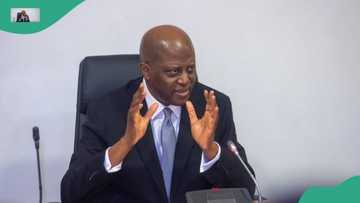DMO Explains How Nigeria’s Debt Ballooned From N97.34tn to N121.67tn in 3 Months
- The Debt Management Office has explained that exchange rate fluctuations contributed to Nigeria's rising national debt stock
- The agency stated this as the nation's debt increased from N97.34 trillion in December 2023 to N121.67 trillion in March this year
- DMO asserted that the debt report under President Bola Tinubu's administration was marginally better than previous reports
The Debt Management Office claimed that exchange rate swings have contributed to the increase in Nigeria's national debt stock, which went from N97.34 trillion in December 2023 to N121.67 trillion in March.

Source: UGC
Patience Oniha, DMO's director-general, stated this on Tuesday in an interview with the News Agency of Nigeria (NAN) in Abuja.
She also cleared up certain misunderstandings regarding the recently released update on the nation's overall debt profile.

Read also
“N1,500 Per Dollar”: CBN Governor sends message to Nigerians over naira depreciation, makes promises
The N24.33 trillion increase in the debt stock, according to her, was also caused by the securitisation of N4.90 trillion as part of the securitisation of the N7.3 trillion Ways and Means advances approved by the National Assembly.
PAY ATTENTION: Share your outstanding story with our editors! Please reach us through info@corp.legit.ng!
She claims that in addition, there is the interest rate and N2.81 trillion in fresh borrowing, which is included in the N6.06 trillion allocated for the 2024 budget.
Oniha emphasised that the Federal Capital Territory (FCT) and the thirty-six states' external and domestic debt were included in the debt stock.
“The total public debt as at March 31, showed that the total public debt in Naira terms stood at N121.67 trillion compared to N97.34 trillion as at December 31, 2023.
“While detailed information was provided on the data such as the split between external and domestic debt as well as the fact that the debt stock includes the domestic and external debt stock of the 36 states and the FCT, it has become imperative to provide some explanations.
“It is important to recognise the fact that Nigeria has undergone some major reforms which have impacted economic indices such as the dollar/Naira exchange rate and interest rates. These two, in particular affect the debt stock and debt service.”
She said:
According to Oniha, the N24.33 trillion increase in naira between the first and fourth quarters of 2024 and 2023 respectively did not technically equate to additional borrowing.
She also said at $42.50 billion in the fourth quarter of 2023 and $42.12 billion in the first quarter of 2024, the overall stock of external debt was essentially unchanged.
Oniha added:
“The Naira values were significantly different at N38.22 trillion and N56.02 trillion respectively, representing a difference of N17.8 trillion.”
“This explains the perceived sharp increase of N24.33 trillion in the total debt stock in the first quarter of 2024.
“The difference in the exchange rate for the two periods also explains why in dollar terms, the total debt stock actually declined in the first quarter of 2024 to 91.46 billion dollars.”
She claimed that compared to earlier reports, the debt report was somewhat better under President Bola Tinubu's administration.

Read also
Electronic transfers up as Opay, Palm Pay, others rival UBA, GTB, other traditional banks in Nigeria
She also said the debt is reasonable and within the typical range if the FX impact is taken into account.
While promising that the numerous initiatives to attract foreign exchange inflows will build external reserves and maintain the Naira exchange rate, she urged the federal government to prioritize fiscal austerity.
Nigeria successfully repays China, World Bank, others
Legit.ng earlier reported that the latest data from the Central Bank of Nigeria (CBN) revealed that the Nigerian government spent $2.19 billion to repay foreign debts to countries and financial institutions.
This was 90% higher than the $1.12 billion recorded in the same period in 2023.
A breakdown of the data showed that the debt service payments were recorded from January to May 2024.
Proofreading by James Ojo Adakole, journalist and copy editor at Legit.ng.
PAY ATTENTION: Unlock the best of Legit.ng on Pinterest! Subscribe now and get your daily inspiration!
Source: Legit.ng



